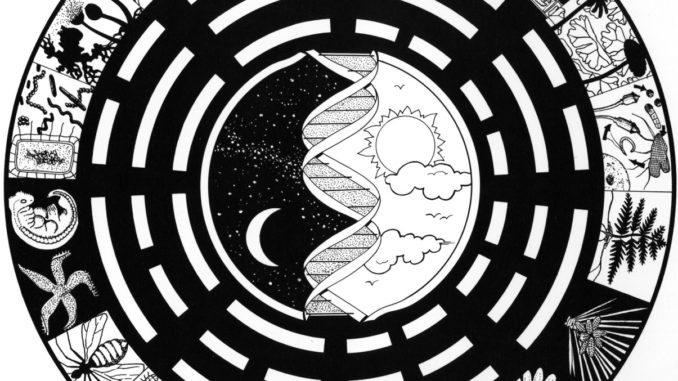
Bio Bites
By R. Gary Raham
A biologist-artist’s ruminations about our roles in a science-inspired world
Jamie Metzl asks this question and many others in his new book, Hacking Darwin, Genetic Engineering and the Future of Humanity (Sourcebooks, 2019). Metzl is a technology futurist, geopolitical expert, and media commentator with degrees from Oxford and Harvard Law. He writes, “We are coming to realize our biology is yet another system of information technology. Our heredity is not magic, we have learned, but code that is increasingly understandable, readable, writable, and hackable.”
The genetic code is written in DNA: deoxyribonucleic acid. The role and structure of that amazing molecule had just been discovered a few years before I was a 10th grade biology student. Now we can, and have, analyzed the entire genome of many creatures, including ourselves. All life on Earth is intimately related as evidenced by our common code. Humans, for example, share 60% of their DNA with a banana, and 85% with a house mouse. We are all variations on a genetic theme.
Editing that code became much easier several years ago when scientists discovered a gene editing tool used by bacteria to protect themselves from viral attack: CRISPR-Cas9. This molecule, borrowed from our bacterial cousins, allows technologists to splice and dice DNA code with amazing speed and accuracy.
Metzl makes the point that “The human genetic revolution is inevitable and approaching quickly,” but he also says “How this revolution plays out is anything but inevitable and is, in important ways, up to us. To make the smartest collective decisions about our way forward we’ll need to understand what’s happening and what’s at stake and bring as many of us as possible into the conversation.”
So, for example:
Would you custom design your baby before birth? If so, how?
By editing out a fatal or debilitating disease?
By engineering the prospect for a long and healthy life?
By upping his or her IQ or athletic ability?
Where would you draw lines on ethical, religious, or moral grounds?
I found it interesting that Metzl writes both science fact and science fiction, as I do. He wrote two science fiction books about this topic because he knows that people love to read an entertaining story. I haven’t read his fiction yet, but plan to look up his books: Genesis Code—which explores the implications of the genetic revolution, and Eternal Sonata, a speculation on the future of life extension. Metzl said that on his book tours he received so many questions about the actual science he alluded to in the books that he decided to write Hacking Darwin.
One of his parting thoughts in the book is that “Humans must and will embrace the genetic revolution, but we will be far better off if we do it together.” He also quotes a comment that is often ascribed to the anthropologist Margaret Mead: “Never doubt that a small group of thoughtful, committed citizens can change the world. Indeed, that is the only thing that ever has.”
What do you think?
Support Northern Colorado Journalism
Show your support for North Forty News by helping us produce more content. It's a kind and simple gesture that will help us continue to bring more content to you.
BONUS - Donors get a link in their receipt to sign up for our once-per-week instant text messaging alert. Get your e-copy of North Forty News the moment it is released!
Click to Donate
